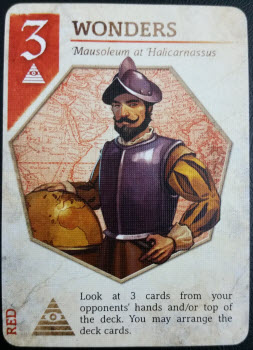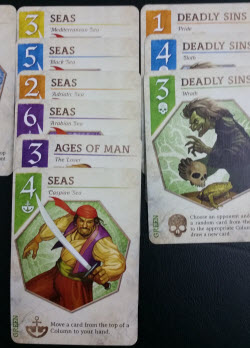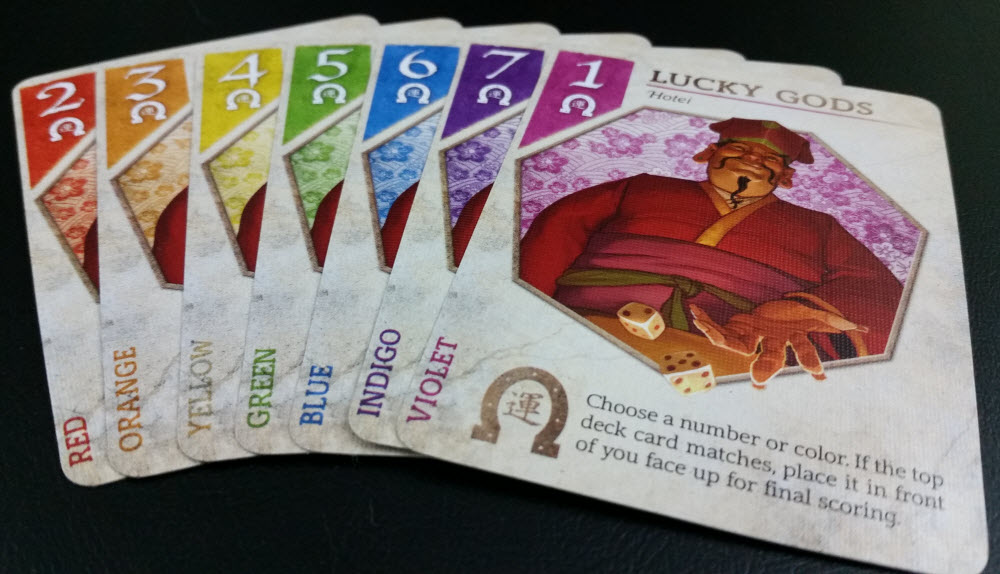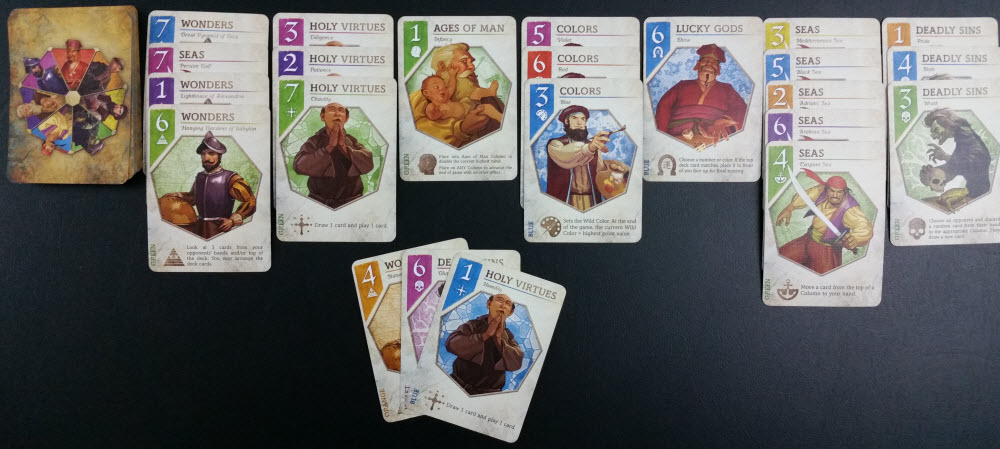As I was going to St. Ives,
I met a man with seven wives.
Each wife had seven sacks,
Each sack had seven cats,
Each cat had seven kits:
Kits, cats, sacks, and wives,
How many were there going to St. Ives?
The Premise
Throughout history and across many cultures, the number seven has held special significance or perceived powers of one kind or another. In this card game, players harness various iterations of seven and use their powers to achieve the highest score possible.
The Rules
As a simple abstract card game, seven seconds is about as much setup time as this game requires. Seven7s is playable right out of the box, consisting of a deck of 49 cards. These are broken down into seven card sets of different colors with values ranging from one through – wait for it – seven. Additionally, each card is one of seven different card types that provide an ability when played.
To begin the game, each player receives three cards. The top card of the deck is then revealed and placed to form the first card column. The starting player is someone whose age is divisible by seven, or barring that, is determined randomly.
Seven7s takes place over a series of simple turns, which consists of playing a card and then drawing a replacement. For five of the seven card types, the player merely adds that card to its respective column (or creates a new one if it doesn’t yet exist), and then resolves the card’s ability. The two exceptions to this are Colors cards and Age of Man cards.
Colors cards determine which color suit in the game is wild, with the most recently played Color being in effect. Wild cards can be played to any column regardless of their actual card type, and they will resolve that column’s card ability instead of their own.
Age of Man cards can be played in one of two ways. Firstly, Age of Man cards may be played to any column, but if they’re added to any column except their own, no effects are triggered. When added to their own column, however, each Age of Man disqualifies the most valuable remaining card values for scoring. For example, if two Age of Man cards are on the board, all sixes and sevens will be worth zero points at the end of the game.
Players continue taking turns until one column reaches seven cards (naturally). At that point, the game ends. Players add up the total value of the three cards in their hand plus any successful Lucky Gods cards. Disqualified cards are worth nothing, but any cards a player has of the last Colors card played are worth the highest value not yet disqualified. The person with the highest score is the winner.
Everyone else may want to consider investing in another lucky number, like eight. Or thirteen.
A Prime Concept
Like games themselves, the concept of lucky (and unlucky) numbers spans across cultures and civilizations. From the sands of ancient Egypt to the sands of southern Nevada, lucky number association has played a role in many beliefs and superstitions for a variety of reasons. Few, however, garner the level of attention the number seven gets. From mathematical quandaries to the seven continents we live on to the number of days in the week, sets of seven continually surround us, often in subtle and unseen ways. The number seven holds important significance in four of the world’s five major religions, for instance, and it shows up in numerous places in the natural world.
That a game was designed whose entire premise is based not on a single instance of seven but on the significance of the number itself is certainly ambitious, if not a little esoteric. What’s even more impressive is how well Seven7s pulls it off.
Drawing inspiration from a diverse cross-section of important clusters of seven, from colors in the rainbow, to Japanese gods, to the literature of Shakespeare, Seven7s weaves different sets together into a seven-sided tapestry that at first doesn’t appear connected at all. The more the game plays out, though, the more its clever flavor reveals itself.
This is largely accomplished by conveying its enigmatic theme while not letting it affect actual gameplay. Although the game uses a mild touch with its flavor, instead letting the mechanics drive the game along, each of the different card abilities still ably matches their unique ‘sevens’ references. The Ages of Man cards, for instance, propel the game closer to ending, just as the Seas cards allows you to move cards around.
What’s more, while the artwork for each card set is identical and repetitive, they each provide some passing mention on which portion of the set its representing. This makes for a subdued application of its theme, but Seven7s nevertheless avoids trying to force the theme highhandedly or being so obscure in its premise that it would fall into a being fully abstract card game.
That said, while the game’s spirited and playful use of different sets of seven solidify its overarching premise on a cardinal level, there is nothing for Immersionists here. Seven7’s light theme is surprisingly cohesive given how small the game is, and this certainly elevates its overall value. However, that theme is entirely surface-laden and lacks many of the traits this group desires. Moreover, because of its simple play-and-draw nature and focus on optimization over growth, there’s little appeal for Architects either. It’s simply not in the cards.
Playing The Odds
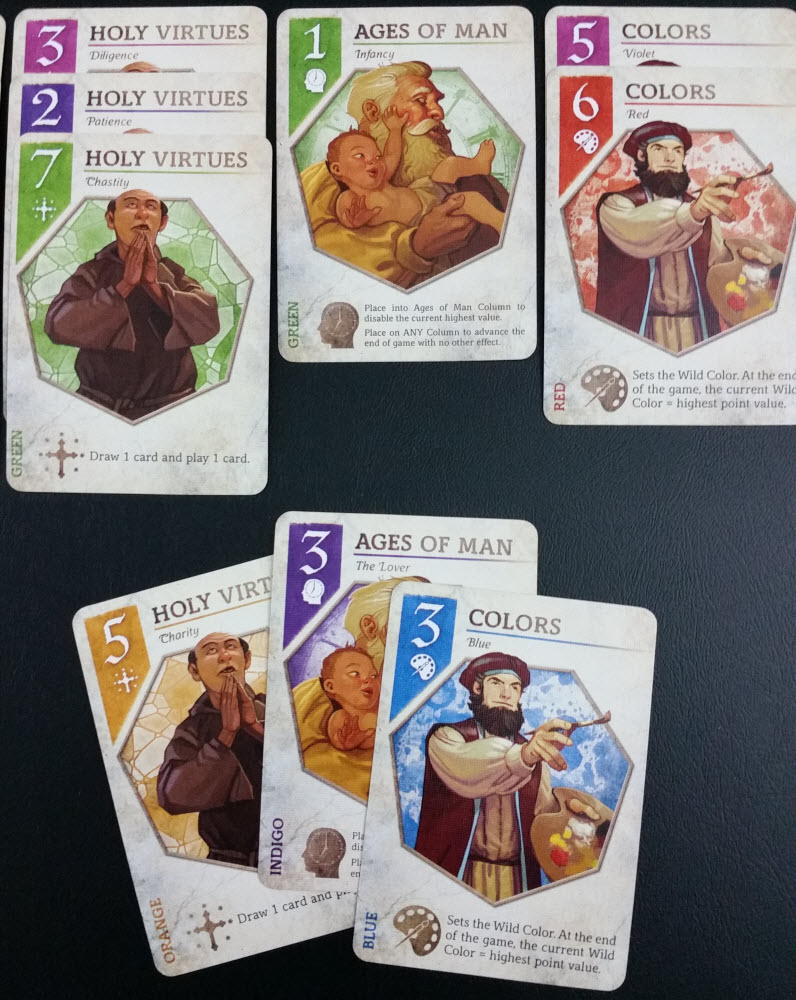
Change the wild Color, play the Virtues card, use the Ages of Man to disqualify 6’s, or toss it into a different row? Choices, choices…
Mechanically speaking, Seven7s is almost as elementary as it gets: play a card, see what it does, draw a replacement. Repeat until the game ends. Yet rather than be a mark against it, the game’s rudimentary structure proves more of a benefit than a hindrance.
For starters, as a game designed to be short (with playthroughs averaging about 20 minutes), the low-complexity ruleset makes it very easy to comprehend. Accessibility is of paramount importance for casual card games like this one, and by keeping the mechanics straightforward, Seven7s achieves that goal handily.
Plus, Seven7’s doesn’t actually need a complicated set of rules to function. While there isn’t admittedly a lot of depth to the game, it does consist of more than pure luck, and it’s in this creative space that the game flourishes. This is mostly due to how well the game leverages incomplete information on the board to make basic strategic decisions.
During the early turns of the game, the field of playable options is wide open. As Seven7s progresses along, however, and the card columns start filling up, every card you add to a column inches it one step closer to the end of the game. Therefore it becomes important to be mindful of both the cards that have been played as well as those that haven’t.
It’s essential to pay attention to how many Ages of Man cards are out, for instance, for determining which cards in your hand will still be worth anything at the end. It’s also helpful to keep an eye on how many cards of a given color are out when playing a Color card or how many of each card types have been played to see what your chances of drawing another one are.
This combination of timing and info gathering adds a hidden layer of intrigue to Seven7s that is easily missed, and it’s this very facet that gives the game a high degree of replayability. This is true regardless of player size, which also highlights What’s more, the game scales well, providing the same experience regardless of player size.
Of course, as wonderfully concise and simple to pick up as Seven7s is, due to its basic nature it won’t resonate with everyone. Tacticians will undoubtedly appreciate some of the nuanced strategy involved, such as reading the board to see the odds of card draws and when to hold on to certain cards versus playing them – not unlike many classic playing card games. However, with a lack of diversity in play style and room (or time) to expand, Seven7s won’t hold their interest long. Likewise, Daredevils will have similar troubles. With a linear gameplay path fueled by a combination of deterministic luck and the need to make slightly-weighted decisions over which cards to play, they’ll only end up feel stifled, coming away feeling anything but lucky.
Do You Feel Lucky?
Seven7s doesn’t eschew its namesake, however. As a card game based around the mysterious and even mystical properties of the number seven, you can’t avoid feeling the ever-present element of chance at work.
Between the game’s simple ruleset, quick turns, and use of unique card powers, Seven7s certainly provides enough player agency for you to make strategically-valued decisions. That being said, much of what you’re able to do in the game – especially the further along you are into it – will broadly be determined by luck of the draw.
Even though this is mitigated somewhat through various card effects, and each player is equally affected, it’s still a notable factor in determining whether you or your opponent will wind up with the cards needed to win the game. Luck in Seven7s even goes so far as to be self-referential via the Lucky Gods cards, whose ability has you guess the color or number of the top of the deck and rewards you with VP if you’re correct.
For Socializers, this is their lucky day, as they should find the game’s combination of casual gameplay and modest player choice quite to their liking. On the other hand, while the degree of luck in Seven7s hardly degrades the game into one of complete randomness, it still has far more unpredictability than Strikers are willing to tolerate. The game has a few ways to disrupt your opponent’s plans, true, but since your ability to do so is often entirely based on chance and timing, they will feel more frustrated than fortunate.
The Takeaway
Seven7s bears definite passing similarities to classic card games like Gin Rummy or Thirty-One, but it would be unfortunate to overlook the game simply based on that fact. Nor should these similarities be seen as a negative. Seven7s pairs the elegance of many classic-style card games with just the right additional degrees of gameplay nuance and mild player choice. The resulting combination of this endeavor is a game that’s quick and social while still providing you with the ability to make basic tactical choices. Its abstract concept about the number seven is impossible to miss, but the game’s unconventional flavor only accentuates its appeal rather than detracts from it. Seven7s is portable, casual, colorful, and easy to play whether you’re short on time or are simply looking for something more low-key. For those considering a short, versatile game, this would be one lucky charm of a choice. Seven-leaf clovers not included.
Seven7s is a product of Eagle-Gryphon Games.
Cardboard Republic Snapshot Scoring (Based on scale of 5):
Artwork: 3.5
Rules Clarity: 4.5
Replay Value: 4.5
Physical Quality: 4
Overall Score: 4.5
Photo Credits: 7-Up by Wikia; Maneki-Neko by Annie Guilloret.

